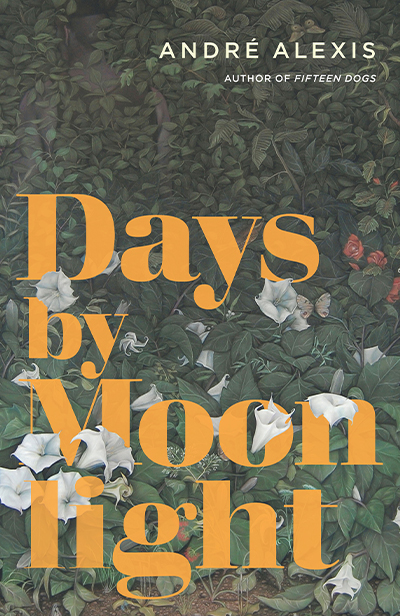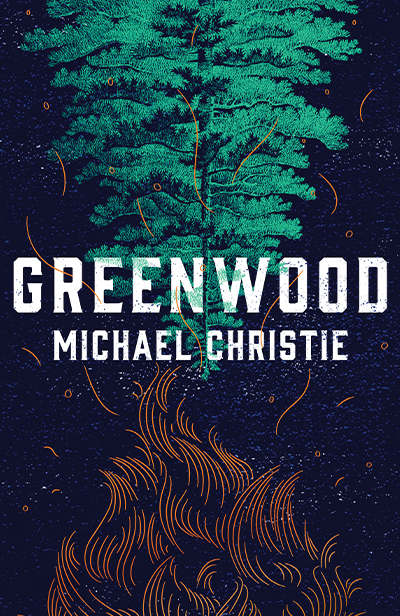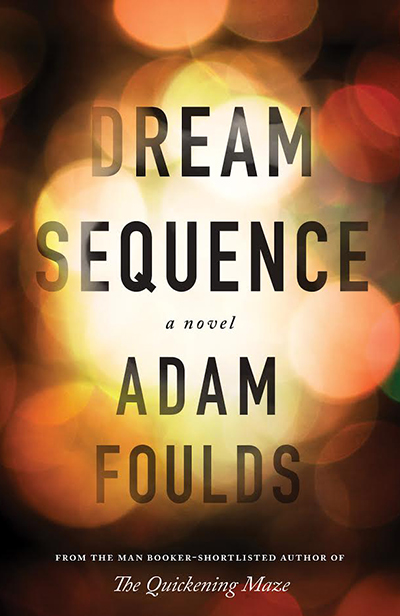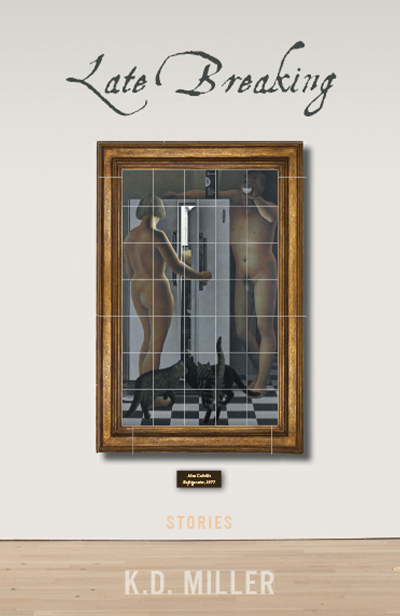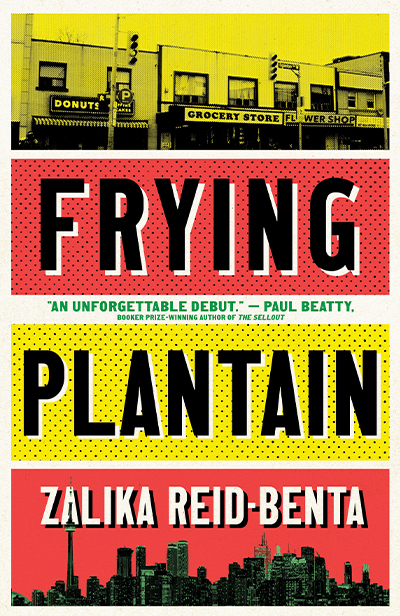2019 Scotiabank Giller Prize Winner
Ian Williams
Reproduction
2019 Shortlist
The 2019 Scotiabank Giller Prize jury announced its shortlist on Monday, September 30, 2019. The six titles were chosen from a longlist of 12 books announced in St. John’s, NL on September 3, 2019.
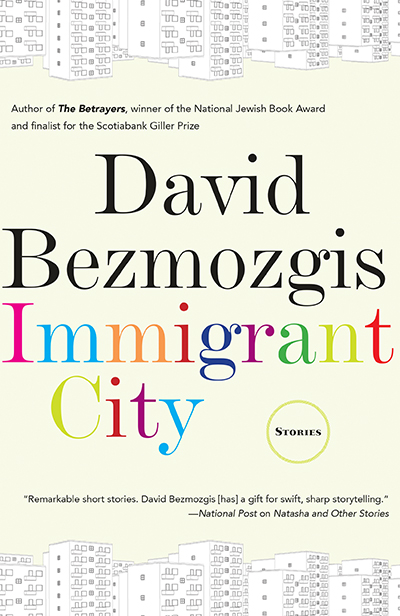
Immigrant City by David Bezmozgis
Biography
David Bezmozgis is an award-winning writer and filmmaker. His debut story collection, Natasha and Other Stories, won the Toronto Book Award and the Commonwealth Writers’ Prize for Best First Book, and was a finalist for the Governor General’s Literary Award. His first novel, The Free World, was a finalist for both the Governor General’s Award and the Scotiabank Giller Prize. His second novel, The Betrayers, was also a Giller Prize finalist and the winner of the National Jewish Book Award. His writing has appeared in many publications, including The New Yorker, Harper’s, Zoetrope: All-Story, and The Best American Short Stories. David has been a Guggenheim Fellow, a MacDowell Fellow, a Dorothy and Lewis B. Cullman Fellow at the New York Public Library and a Radcliffe Fellow. He is the director of the Humber School for Writers. Born in Riga, Latvia, David lives in Toronto.
Jury Citation
“The heart barks like a dog,” writes David Bezmozgis in one of the short stories contained in Immigrant City, and the bark echoes down generations, interrupting the everyday, vibrating with nostalgia and lost memories. In this wise and assured collection, Bezmozgis has reimagined immigrant lives not simply as marked by displacement and discontinuity, but of immigration as a shared and binding experience that crosses the boundaries of race, nationality, occupation, class, politics and even past betrayals, to serve as a point of connection and compassion between Bezmozgis’s characters.
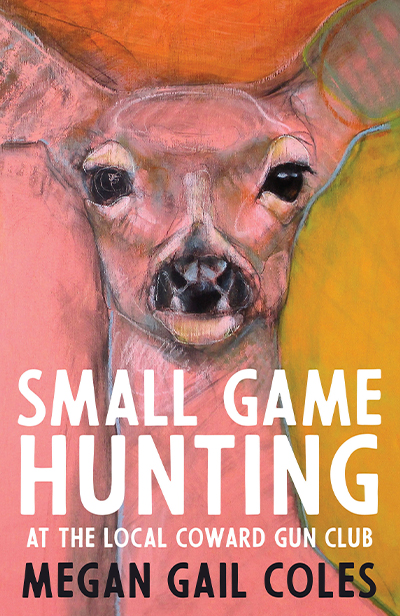
Small Game Hunting at the Local Coward Gun Club by Megan Gail Coles
Biography
Megan Gail Coles is a graduate of Memorial University of Newfoundland, National Theatre School of Canada and recently completed a Masters of Fine Arts from University of British Columbia. She has written numerous plays, and her first short fiction collection, Eating Habits of the Chronically Lonesome, won the BMO Winterset Award, the ReLit Award, the Margaret and John Savage First Book Award and earned her the Writers’ Trust 5×5 prize. Small Game Hunting at the Local Coward Gun Club is her debut novel. Originally from Savage Cove on the Great Northern Peninsula of Newfoundland, Megan currently resides in Montreal where she is a PhD candidate at Concordia University.
Jury Citation
Early in Small Game Hunting, a Nigerian immigrant asks the heroine about her true origins:”You don’t look all-white,” he says. In other words, this is not your traditional Newfoundland novel of social isolation. Instead, Megan Gail Coles portrays the harsh existence of the islanders’as emblematic of the human condition itself. The characters’ lives unfold around a fine restaurant. They are physically and emotionally crippled by their society’s devastating inequalities, the women psychologically maimed by repeated sexual assault. Coles’s narrator storms against the status quo in a kinetic novel that dazzles, challenges and exhilarates.

The Innocents by Michael Crummey
Biography
Michael Crummey’s first novel, River Thieves, was a finalist for the 2001 Scotiabank Giller Prize, and his second novel, The Wreckage, was a finalist for the Rogers Writers’ Trust Fiction Prize. His third novel, Galore, won the Commonwealth Writers’ Prize (Canada and the Caribbean) and was a finalist for the Governor General’s Literary Award. His most recent novel, Sweetland, was also a finalist for the Governor General’s Literary Award. He lives in St. John’s, Newfoundland.
Jury Citation
Written in a language that is at the same time fresh and ancient, Michael Crummey’s The Innocents is a (mis)creation myth that demands a reconsideration of what we think we know about love and death, family and loneliness, oblivion and wisdom, horror and beauty, bodies and knowledge, violence and desire. Anchored in exquisite specificity and heartbreaking simplicity, and inviting us into a distant past that makes fresh matters of ever-present concern about survival and sacrifice, Crummey’s novel has the capacity to change the way the reader sees the world.
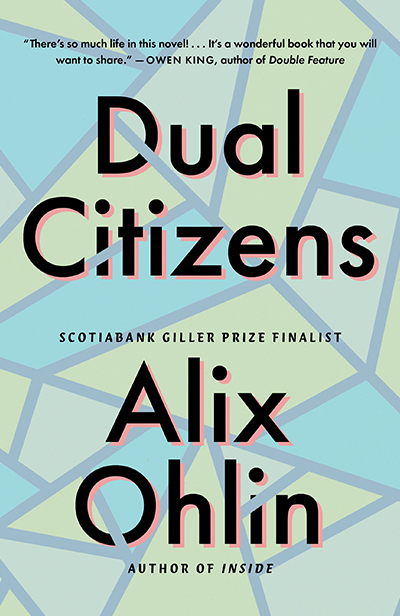
Dual Citizens by Alix Ohlin
Biography
Alix Ohlin is the author of four books, most recently the novel Inside, which was a finalist for the Scotiabank Giller Prize and the Rogers Writers’ Trust Fiction Prize. Her work has appeared in The New Yorker, Tin House, Best American Short Stories, and many other publications. Born and raised in Montreal, she lives in Vancouver, where she chairs the creative writing program at the University of British Columbia.
Jury Citation
Chronicling the wayward trajectories of two very different but equally fascinating Montreal-bred sisters from childhood into midlife, Alix Ohlin’s novel, true to its title, quietly refutes monolithic tenets that regard identity as something fixed and singular. Dividing its narrative between Canada and the U.S., the urban and the wild, solitude and solidarity, creativity and caregiving, Dual Citizens is a long-term sororal love story and affecting double-portrait of female self-actualization untethered from established paradigms of ambition.
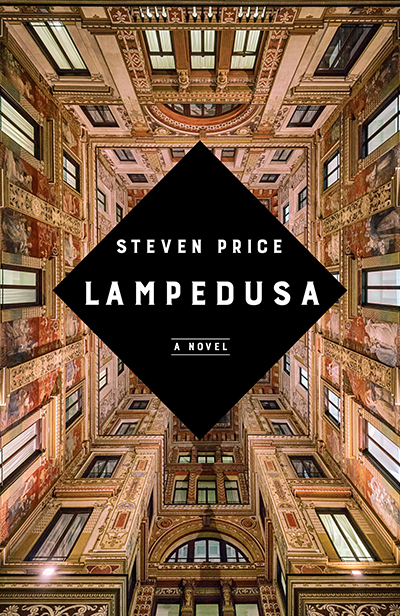
Lampedusa by Steven Price
Biography
Steven Price is the author of two novels, By Gaslight (2016), longlisted for the Scotiabank Giller Prize, and Into That Darkness (2011). Also an acclaimed poet, he has written two award-winning poetry books, Anatomy of Keys (2006), winner of the Gerald Lampert Memorial Award, and Omens in the Year of the Ox (2012), winner of the ReLit Award. He lives in Victoria, B.C.
Jury Citation
Lampedusa is a fairy tale about a dying prince, the last of his line, the real-life Giuseppe Tomasi di Lampedusa, author of the beloved Italian novel The Leopard. Steven Price powerfully imagines Tomasi’s final days as the ailing author struggles to complete and publish his treasured manuscript. Set in a post war Palermo of bombed-out buildings and ruined palazzos, the novel contemplates what values are worth retaining in life and in art. A masterful storyteller, Price conjures Tomasi with language and images that evocatively fix him and his distant world indelibly in our minds.
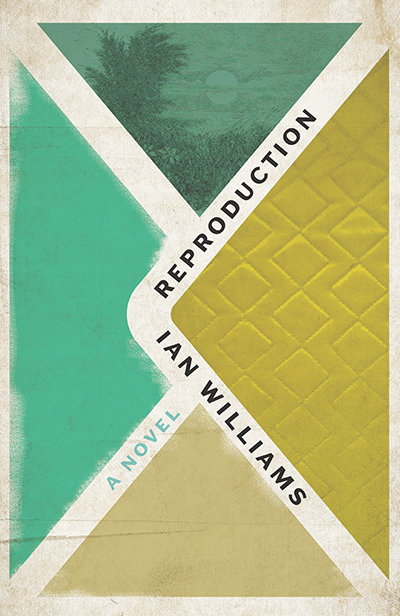
Reproduction by Ian Williams
Biography
Ian Williams is the author of Personals, shortlisted for the Griffin Poetry Prize and the Robert Kroetsch Poetry Book Award; Not Anyone’s Anything, winner of the Danuta Gleed Literary Award for the best first collection of short fiction in Canada; and You Know Who You Are, a finalist for the ReLit Prize for poetry. He was named as one of ten Canadian writers to watch by CBC. Williams completed his Ph.D. in English at the University of Toronto and is currently an assistant professor of poetry in the Creative Writing program at the University of British Columbia. He was the 2014-2015 Canadian Writer-in-Residence for the University of Calgary’s Distinguished Writers Programme. He has held fellowships or residencies from the Banff Center, Vermont Studio Center, Cave Canem, Kimmel Harding Nelson Center for the Arts, and Palazzo Rinaldi in Italy. He was also a scholar at the National Humanities Center Summer Institute for Literary Study and is a judge for the 2018 Griffin prize. His writing has appeared in several North American journals and anthologies.
Jury Citation
Ian Williams’s Reproduction is many things at once. It’s an engrossing story of disparate people brought together and also a masterful unfolding of unexpected connections and collisions between and across lives otherwise separated by race, class, gender and geography. It’s a pointed and often playful plotting out of individual and shared stories in the close spaces of hospital rooms, garages, mansions and apartments, and a symphonic performance of resonant and dissonant voices, those of persons wanting to impress persuade, deny, or beguile others, and always trying again.
2019 Longlist
The 2019 Scotiabank Giller Prize jury announced its longlist on Monday, September 3, 2019.

Immigrant City by David Bezmozgis
don’t take her, she cries.
Recently, backing out of a tight parking spot, I damaged the front passenger-side door of our car. I heard the sound of metal against concrete, the sound of self-recrimination, dolour and incalculable expense.
In the aftermath I called my wife, who was born in Amer- ica and raised in mindless California abundance. For her family, scratching cars and misplacing wallets was like a hobby. I, on the other hand, had been an immigrant child, with all the heartache and superiority that conferred. We ate spotted fruit. I told my wife what I had done; her response was less than sympathetic.
I called the car dealership; I called a local body shop; I called a number tacked to a telephone pole. Then I called my uncle Alex, whose greatest fears were identity theft and getting a bad deal. He told me of a Serbian mechanic who, if you paid in cash and didn’t ask any questions . . . I started dialing the Serb’s number when I remembered the year was 2015 and the incompatibility of my uncle’s fears. On a classifieds website I keyed in the make and model of my car door. Who knew? Didn’t every kind of flotsam wash up on the blasted shores of the Internet, including a black 2012 Toyota Highlander front passenger-side door? Indeed, there one was, offered for sale by Mohamed Abdi Mohamed of Rexdale. In the accompanying photo, taken on an apartment balcony, the sun glinting off its immaculate finish, it looked
just like my door before I’d mangled it. I sent Mohamed a text. He texted me back. I counter-texted. Soon we had a deal, consummated in texts.
There are a number of practical questions that could be posed at this point. Presume my wife posed and I answered them. However, there are many different considerations in life, and practical is a relative term. Perhaps buying a car door from a stranger on the Internet isn’t the most practical decision, but I was viewing the thing in existential terms. I was asking: Who am I? How far have I strayed from my for- mative self ? What—ai, ai, ai—is the song of my soul?
The next morning, I prepared to go get my door. My wife
needed the car for work, but that didn’t deter me.
“How do you plan to get it home?” she asked. “Like an immigrant.”
As I put on my shoes, Nora, my four-year-old, sidled up to me. “Where are you going, Papa?”
“To get the door.”
We were in that aimless interval between the end of summer camp and the start of the school year. A nanny was looking after the baby, and the two older girls were either fighting or intertwined in front of the television, a lazy fan spinning overhead.
“I want to come with you,” she said. “It’s far,” I said.
In anticipation of my answer, she made ready to cry. I reflected: Wasn’t this precisely the sort of trip my daughters needed? What did they know of the real world? While
they ate take-out sushi, Syrian refugees were being tear-gassed by Hungarian cops, and Greek grandmothers, flayed by austerity, were walking off rooftops.
My oldest daughter resisted all coercion, so Nora and I set out on the journey by ourselves—first by streetcar through our gentrifying neighbourhood, then by subway to the end of the line, almost to the airport. By the last stop the train had nearly emptied out, leaving few representatives of white privilege. Those who remained looked pallid and desiccated, as if they’d been too weak to flee with the others.
At the station we boarded the number 45 bus that would take us up to Dixon Road. Nora is a particularly pretty child; old women are forever touching her face. On this bus too, where most everyone might have been a relation of Mohamed Abdi Mohamed’s. Nora didn’t mind. She is very companionable. A bearded man beside us was reading a book, which she misheard as being about the five pillows of Islam.
From the bus stop, it was not far to Mohamed Abdi Mohamed’s address. On either side of the street rose apartment buildings, thrumming with life and larceny. There it was, my immigrant childhood.
“Papa, are you crying?” Nora asked. “When Papa was a little boy,” I began.
We crossed a green lawn. We saw a modest playground. A little girl in a hijab was swinging very high. We saw a basketball court without any hoops. We saw a mound of trash composed of broken furniture and discarded strollers.
On benches in front of the building, Somali women in traditional dress turned their eyes to us. Four security guards stood by the entrance doors, wearing grey uniforms and body armour. We were in what was known as a “priority neighbourhood.”
In a long list of Mohameds, I found my Mohamed. A friendly, gravelly voice bade us up. The door buzzed. Worn carpeting, dim lighting, elevator walls scored with initials. “Smell,” I said to Nora. The acrid spice of life wafted from
every door.
Mohamed was in the hall waiting for us. Somalis are commonly tall and thin. Mohamed was tall and thin. He had a handsome, sculpted face, and a high, regal forehead. “Very nice,” he said. “I also have a daughter.”
In addition to the daughter, he had a son and a wife, who greeted us wearing a long dress and a lavender hijab. The daughter, the same age as Nora, wore shorts, a T-shirt and a sparkly pink hijab. The boy was eating his lunch, a chicken drumstick clutched in his little fist.
I confided to Mohamed that I too had been an immigrant boy. That my father had garbled the English language, and that my mother had cooked chicken drumsticks, which I had eaten, often cold. Mohamed nodded. Fraternal understand- ing passed between us.
“Would you like to see the door?” Mohamed asked. “Yes,” I said. “It is upstairs,” Mohamed said, “at my uncle’s apartment.”
I looked over at Nora. She had joined Mohamed’s daughter in combing the mane of a plastic horse.
Mohamed intuited my concern.
“Your girl can stay here. She will be happy. My wife will watch. Upstairs is just men.”
The mind descends quickly to dank depths. Mohamed had never mentioned an uncle before. I thought: If I am dismembered upstairs, what will happen to Nora? Or what if upstairs is merely a ruse? Mohamed’s wife and children seemed harmless and kind, and I hadn’t forewarned Mohamed that I was bringing my daughter, but what did I know of Somali folkways? When I was a baby in Soviet Latvia, a Gypsy woman had once walked off with my unattended stroller. My father too had nearly been taken by Gypsies. Such things happened. Humans trafficked other humans for vile ends. It didn’t seem wise to bring Nora upstairs, and it didn’t seem wise to leave her behind. The wise decision was to take my child and go home, but I didn’t want to offend Mohamed. What if I were mistaken? Not seconds before, he and I had shared in a moment of genuine spiritual communion. What stock could be placed in feelings if we were so quick to disregard them? And would I have been so quick to disregard them if Mohamed hadn’t been Muslim and black? Then again, what price enlightenment? Surely not a father’s love for his young daughter. Before we’d left the house, Nora had asked me to put her hair in a ponytail and I had done it.
If you have done it, then you know that this is an experience of the most tender and terrifying love, for which you would readily give your life.
“Nora, I need to go upstairs for a minute,” I said. “Is that okay?”
Nora was in a pony and unicorn phase, so I had to repeat myself before she looked up and mouthed, “Okay.”
Mohamed guided me out the door and into the moldering hallway. As I followed him, I reflected unhappily upon my character. It occurred to me that my problem was not indecisiveness but inconsistency. It wasn’t that I was incapable of being firm, only that I couldn’t reliably predict when I would do it. This was somehow worse.
We rode the elevator up six floors, the mechanism churning, Mohamed smiling benignly. As we ascended, marijuana fumes filtered into the chamber. When the doors opened, my first breath was coarse-edged. From one side of the corridor came the sound of young men’s voices. I turned to look, though Mohamed deliberately did not. Three Somali teenagers peered back at me with proprietary insolent swagger. One lifted his T-shirt, as if to expose a gun in his waistband—only there was no gun. His friends laughed and one called to me, “You looking to score, motherfucker?”
Mohamed seized me by the arm and pulled me after him. “Those are not good boys,” he said. “Even if in school you are only a black face and the manager of the doughnut shop will not give you a job, it doesn’t mean you should become like this.”
We ended up at an apartment at the opposite end of the corridor from the boys. Mohamed knocked three times in quick succession, paused, and knocked twice more. After a time, a young Somali man with a sleeping bag draped about his shoulders opened the door.
“Assalam Alaikum, brother,” the man said. “Alaikum Assalam,” Mohamed replied.
The man stepped aside. In the entryway there were at least a half-dozen pairs of shoes, mostly sandals, neatly arranged. Mohamed added his pair to their number, and I did the same. Before us was a room almost entirely devoid of furniture. Several overlapping rugs covered the floor. Along the walls, men appeared to be sleeping, their faces concealed under blankets or sleeping bags to shield them from the bright day- light. None of the men stirred when we entered, and even the man who’d admitted us returned to his place on the floor and drew his sleeping bag around him. There was one young man, also Somali, who wasn’t sleeping. He sat on the floor, his back to the balcony, typing rapidly on his laptop. He wore large headphones and glanced up only briefly to register my and Mohamed’s arrival. The only other person in the room was an old man seated in a brown leather armchair. He was dressed in a white shirt and black trousers, his feet bare on the rug. His face was smoothly shaven, and under a white woven skullcap, his grey hair was carefully trimmed. From where I stood in the doorway, his face was presented in pro-
file. It took a moment for me to apprehend that he was blind, his visible eye milky and unseeing.
“Hello, Uncle,” Mohamed said, and bent to kiss him on either cheek. Mohamed motioned for me to draw near.
“This is the writer,” Mohamed said, though I’d never told him my occupation. For a moment I was unsettled by this, but I was also aware that my reaction was dishonest. In the age of the Internet, I was frankly surprised and disappointed whenever I met someone who hadn’t troubled himself to acquire the basic and easily accessible information.
Mohamed bade me kneel down by his uncle’s chair. The old man faced me and put his hands atop mine, as though to divine or communicate something through his smooth, dry palms.
“In Somalia, before the civil war,” Mohamed said, “he was minister of justice. But warlords captured him. Tortured him. Took his sight.”
I thought the old man would say something, but he didn’t speak. Perhaps the warlords had also taken his speech. He continued to regard me with his sightless eyes and to gently cradle my hands in his. This lasted for what seemed like a long time, though neither he nor Mohamed behaved as though it were in any way peculiar.
Eventually Mohamed said, “Come.”
He went to the door that opened to the balcony. He pulled it open and stood in the aperture waiting for me. As I approached, Mohamed turned to the young man with the laptop and issued an order in Somali. The young man shot Mohamed a harsh, resentful look but nevertheless removed his headphones and rose to his feet. He left the room and dis- appeared down the short hallway that led to what I imagined was the bedroom.
On the balcony the car door was concealed under a white tablecloth. Mohamed lifted the tablecloth and exposed a door that looked exactly as advertised. While I inspected it, the young man whom Mohamed had sent on his errand stepped out onto the balcony and handed Mohamed a warped sheaf of pages bound with rubber bands. There followed a terse exchange in Somali between Mohamed and the young man, which concluded with the young man clicking his tongue at me disparagingly and returning inside.
“Pay no attention. It is just Abdirashid,” Mohamed said. “He is clever and loyal but he is distrustful of Jews.”
“Mohamed,” I said, “I have to ask: Who are these men, where did you get this door, what is happening here?”
“My uncle is dying,” Mohamed said. “These men are here to care for him. For Somalis, he is a national hero, the people revere him, he could have been very useful to America and Canada, offered his counsel to kings and presidents, but nobody cared to ask. They neglected and forgot him like he was trash.”
At this point Mohamed extended the sheaf of papers to me. “These are his memoirs. It is a great story. A million people should read it. There is war, love, family, power, land, God, magic. It needs only a writer. I took your book from the library. At the story of the old Jew dying, I wept. I thought,
That Jew is my uncle.” Mohamed pressed the pages on me.
“Mohamed, I don’t know anything about Somalis,” I said. “Nobody knows. That is the problem,” Mohamed said. “If
you just read the papers, the car door is free.” “Is that your only copy?”
“No, Abdirashid has a file on his computer.”
I agreed to take the papers, but only on the condition that Mohamed understand that I would probably never write a single word about his uncle.
“If you read the pages,” Mohamed said, “I am confident you will write this story.”
People were always offering writers their stories, I thought. But those were rarely the stories writers wanted. Those sto- ries were like children who always raised their hands in class. Good stories didn’t raise their hands.
I paid Mohamed the sum we had agreed upon, and he helped me carry the door into the apartment. We stopped so he could fetch a satchel for the manuscript. I stood beside his uncle with the door resting against my hip. The old man, seated as before, started to hum an ancient dirgelike tune. It resonated deep in his throat, like a prisoner in a cave.
Mohamed returned with the satchel, and I slipped my arm through the loop. We carried the door together out of the apartment. It was heavier than I’d expected, but I thought of the Syrians, the Iraqis, the Afghans, the Eritreans, the Sudanese, as well as my father, my grandfather and all my persecuted forebears.
In the corridor the same boys were still getting high. Again, Mohamed did not deign to look at them. I tried to follow his example. Still, we knew that we were the objects of their laughter and scorn.
“Yo, Mohamed,” one boy called. “How’s the caliphate?”
Mohamed spun and barked something in Somali, but it made no impression. They continued to laugh as Mohamed glared at them with steely tight-lipped ire. Our elevator arrived; the heavy metal doors enacted their grim choreography. Mohamed faced the panel and brooded upon the blue illuminated numbers, while I was conscious, as I sometimes am in elevators, of winching down a narrow shaft on dusty cables in the dark.
From the elevator we trod wordlessly to Mohamed’s apartment. When he opened the door, I saw Nora sitting rigidly on the sofa, her face puffy and tear-stained. Mohamed’s wife fussed about her, pinning a pale blue hijab around her face. Once she spotted me, Nora’s eyes darkened with hurt and anger. Fresh tears formed and ran down her cheeks.
“You left me alone,” she said. “I’m sorry I scared you,” I said.
I opened my arms, and quick to shed her anger, Nora ran over and hugged my legs. I placed my hand atop her hijab and felt the warmth of her little head emanating through the soft fabric. “She was very sad,” Mohamed’s wife said. “So we made for
her this gift.”
I noticed Mohamed looking on approvingly, his old amiability returning, as though he’d received an antidote to the toxins from upstairs. The entire family accompanied us to the elevator, Mohamed helping once again with the door. When we parted it was with the proclamations of bosom friends or relations, not strangers who had engaged in a bizarre commercial transaction.
Alone in the elevator, Nora and I regarded each other. “Papa,” she said.
“Yes, my love,” I replied.
“When can Samiya come over for a play date?”
“I don’t know,” I said.
Nora studied me for a moment and elected not to press the matter. “Is it true you met a big teacher upstairs?” she asked.
“I met somebody,” I said.
“Samiya’s mom said you were meeting a big teacher.” “I met a sick old man.”
“Oh,” she said.
I reached over to stroke her head. As I started to loosen her hijab, Nora recoiled. “You know you don’t have to wear that anymore,” I said.
“But it’s mine,” she said in the injured tone she used whenever I tried to take anything away from her. The elevator arrived at the lobby. I thought of how one might explain to a four-year-old the raft of complicated, legitimate and paranoid reasons that militated against her wearing her gift in public, but the mere prospect of opening my mouth felt hideous and exhausting. I was also aware that I was a man with a car door who feared that Nora’s hijab would make us weirdly conspicuous.
In the end it didn’t matter. In an immigrant city, a city of innumerable struggles and ambitions, a white man with a car door and a daughter wearing a blue hijab attract less attention than you might expect. People, after all, are immersed in their devices and concerns. On a crowded bus or a packed subway car, they do not necessarily surrender their seats. It wasn’t until the streetcar that we finally got two seats together.
Nora had the window, the breeze blowing in; I had the aisle, the door propped up so that I too was looking through a win- dow. The streetcar rocked Nora to sleep in my lap. When our stop approached, I nudged her gently. Her hijab had slipped down over her brow. Drowsily, she opened her eyes.
“Nora, it’s our stop,” I said. “Do you want to go home or keep going?”
“Go home and keep going,” she said.
—
Excerpted from IMMIGRANT CITY. Copyright © 2019 by David Bezmozgis. Excerpted by permission of HarperCollins Publishers Ltd. All rights reserved. No part of this excerpt may be reproduced or reprinted without permission in writing from the publisher.

Small Game Hunting at the Local Coward Gun Club by Megan Gail Coles
Iris has seen grown women brought to their knees.
She too has been grounded in a slow miserable stagger. Suddenly scared and embarrassed when upright women attempt to assist her by pulling at her armpits, tugging at her damp hood, wiping back mangy fur-trim slick with puke against her wet face, to help her, they say. The erect urging a crumbling Iris to place her weight on them. The upstanding, having not a clue about the heft of their request, will email each other about the great horrible heaviness of her months later.
Their hurt for having borne her weight momentarily has been determined far greater than her hurt for having carried it nearly three decades.
They don’t have a clue.
They’ve degrees in Earth Science and black-and-white photos of ancestors ages passed. They’ve been, for the most part, happy in a vertical world and hardly ever worried about accidental death. When they drink to drunkenness, it is in celebration; there is liveliness and bear-hugging and smoked salmon and chips.
Their faces hurt for very different reasons.
It would take them by great surprise to discover another quality of living. Their sweet brows, a deep furrow of concern and disbelief, as Iris labours to right herself so as to unburden them.
And like all buckled women, Iris is keenly aware that the shiny women are making themselves feel better for a time by helping her sickly self up when they’ve no real intention to give up their happy access to address the sleek slope that harms her.
Iris knows well enough.
She straddles shiny and sickly every day. Her mother is both, though never at the same time and never believably. Not like our Iris. It boggles Joanne’s fucking mind how fluidly her best friend transitions from one to the other. The light and dark meat of her constantly on offer for those who aim to feast at the buffet.
Men. Men mostly. Mind you, straight men rarely slow to help her up.
The occasional homosexual will have sympathy enough to stop and steady Iris, but rarely straight men. Her stooped nature is a temptation that offends them when forced to face the conditions they’ve created in the wide open. Collateral damage consisting of women and children and dogs. The elderly. The ill.
Iris has overheard scientists discussing intergenerational trauma over lunch.
Shared memory, a kind of genetic recall of shame and hurt.
ACEs, they called them. Adverse Childhood Experiences.
Iris has a pocket full of ACEs.
Teachers always spoke to her in pitiful tones and never called home when a lunch was mislaid, assuming there was no food or no one awake to pack it. Doctors offered birth control to her while she was still in a training bra to curb what was expected of her scrawny body, claiming blemishes were of concern while facing a clear complexion. Meanwhile, dentists with rum on their twisted tongues urged older folk for full clearance, implying Iris’s kin could not afford even the teeth in their heads.
There had never been an expectation of forefathers and there remains no expectation now.
Iris was meant to want nothing, demand less, not more. Her father’s absence laying well the groundwork for the first one and then the next one and then John.
He had told her in honest afterglow that they were not even half a thing.
Not even half a thing, ringing on repeat in her head. One foot in front of the other through the slush on the downgrade toward The Hazel.
Not even half of something.
She has learned to abuse herself in a misguided attempt at thwarting expectation.
You don’t deserve any better.
But very deep inside her body a tiny voice whispers into soft cupped hands . . .
. . . but you do.
Iris needs to get her paycheque and pay her phone bill before they disconnect her. She is determined to stay the course. She hauls the snarl of tangled dark hair from her eyes as she passes houses where she once attended parties. Iris used to be invited and beloved. But she can’t bear to make eye contact with anyone anymore. Every party ends in tears. They will hate her for what she has done. What he has convinced her to do. She harshly counts and recounts her sins. Iris feels poorly.
Though riches, emotional and otherwise, have always made her uneasy.
Sure, even when she has money in her wallet a pervasive impoverishment runs through her. She can’t get rid of it fast enough. It feels stolen. Not meant for her. She thinks someone will take it back. Or worse yet, call her out for being so bold as to expect to ever have money on her person. Who does she think she is? The Queen? No sir. Not Iris.
She played pretend-poorer as a child to lessen the bleakness by comparison. Her Fisher-Price dolls lived on farms far away from any ocean, this being the bleakest thing she could think up as a child. Feeding pigs. Harvesting grain. The thought of such dry vastness made the baygirl scratch an imaginary itch. She has always feared the great plains. She wouldn’t make much of a farmer. Nothing fit to eat would grow. Gnarly vegetables. Self-disgust. And failure.
But baygirls make great waitresses.
They’ve the ideal upbringing for the whole undertaking. Efficiency bred out of necessity centuries ago, refined by capital and industry. Taking too long resulting in sickness and/or death.
Iris had better manage this time, it’s the only time she’ll get. Before she dies dead. Sure, she won’t mind doing all of this. What with all her free time.
Young ones got a lot of time on their hands. That one over there. No youngsters or nothing. Still don’t know how to relax.
Relax! What a waste of time, which is money Iris needs for food to live. Because she’s hungry. So fucking hungry. But she’s not to eat. Don’t dare drop an extra drop in.
That is not for you, girl.
Let the men sit down first. Give your father the biggest pork chop if he’s home.
Eat potato if you’re starved. There are crackers in the cupboard. Iris will have the garden salad. No. A water. No. A steak. No. Nothing for her, thanks.
Because she’s been so bad lately. Iris had been so bad. Is. So. Bad.
Her bread is mixed with molasses and guilt. Good women never eat more than a sliver.
Even if they’ve had so little. Nothin this whole time. Empty sure.
Iris has had to suck a peppermint knob and contempt to sustain herself.
Look’ve her, luh. Tits on that. Useless, useless as tits on a bull.
Hey misses! Hey girl! Hey Iris! Smile sure while you’re at it.
Would it kill Iris to smile while she hands them their food?
Put on a dress, look pretty, eat nothing, have no feelings, never complain. What else can Iris do? Mississauga is calling. Welcome to the National Student Loan Service Centre —
Ring! Ring! When her phone is actually connected.
The government wants their money back now!
Newfoundland has run out of fish/wood/oil and patience, again. Where did it all go?
Spent on coke and hookers no doubt.
Iris robs light bulbs from the living room to brighten the bathroom. It’s that or pissing in the dark.
Men yell at her from their massive trucks to get out of the jesus road.
Are you stupid, girl? Are you? Stupid!
She could talk back but has been socialized against it.
Instead, Iris sneezes into her sleeve as she sidesteps snow boulders pushed into her way. Sidewalks are for better people, she thinks, as she once again steps onto the slushy street to speed along the journey. Her gratitude for proper winter footwear swells despite her boots being purchased as an act of penance.
Not that boots could ever make up for ruining her life.
Iris dodges a side-view mirror which lies dormant after being snapped from a parked car by a snow-clearing crew full of contempt. Gashes of green municipal vehicle paint tag the driver’s side of a dozen cars clinging to the crusty curb. But Iris cannot be dissuaded.
Her hangover has legs.
There’s a clarity of purpose in its stride. A well-directed hangover, when gainfully rehearsed, will put the fear of god into those who have undone you. Iris can feel her filter falling away with each step. Sliding right off the back of her. What is left is a kind of self-preservation that would shock evolution into sitting up straight. Every man who has ever loved her has attempted to acclimatize themselves to this morning state of her, but no good will come of that.
She won’t have it.
Iris, like every lady drinker before her, steels herself against it. It would be better, gentle man, to not have behaved like a manipulative prick from go. Iris will not feign innocence or blame the universe. The universe does not care for her atrocious decisions.
Iris Young is twenty-nine years old and that is old enough to know better.
She did what she did and will get what has always been coming to her. And then she will give it back.
Because some men deserve to be brought to their knees.
—
Excerpted from SMALL GAME HUNTING AT THE LOCAL COWARD GUN CLUB. Copyright © 2019 by Megan Gail Coles. Excerpted by permission of House of Anansi Press. All rights reserved. No part of this excerpt may be reproduced or reprinted without permission in writing from the publisher.

The Innocents by Michael Crummey
They were still youngsters that winter. They lost their baby sister before the fi snowfall. Their mother laid the infant in a shal- low trough beside the only other grave in the cove and she sang the lullaby she’d sung all her children to sleep with, which was as much as they had to off r of ceremony. The woman was deathly sick herself by then, coughing up clots of blood into her hands.
The ground was frozen solid when she died and even if their father had been well enough to shovel there was no digging a grave for her. He and Evered shifted the covering of reeds and alders away from the overturned boat and hauled it down to the landwash before they carried the corpse from the house. They set it in the boat along with half a dozen stones scavenged along the shore. Their father slumped against the gunwale to catch his breath.
“Will I come out with you?” Evered asked.
He shook his head. “You stay with your sister,” he said.
The two youngsters watched him row away from shore and out beyond the shoal water with his dead wife. They saw him
leaning below the gunwales for what seemed a long time, his head and shoulders bobbing up now and then. He was working at something awkward and unpleasant it seemed though nei- ther could guess what it was. They watched him wrestling the weight of the corpse with his back to the shore. He was far enough off they couldn’t see that their mother was naked when she was tipped into the black of the winter ocean.
Their father tried to hand the clothes to his daughter when he rowed in but Ada held her hands behind her back and shook her head fiercely.
“You’ll have need of these,” their father said. “Now the once.” Evered took them, folding the limp fabric against his stom- ach. The sour smell of a long illness and of his mother which he couldn’t separate in his head. “I’ll set them by for her,” he said. Their father nodded. He was too exhausted to climb from the boat and he sat there a long while. A dwy of snow had blown in across the bay and it turned the hair of his bowed head white
as they waited.
Their father died in his bed before the new year.
Without speaking of it they acted as if he was only asleep and they left him lying there for the better part of a week. Hoping he might wake up coughing in the middle of the night, complaining about the cold or asking after a drink of water. During the day they dawdled about in the store and spent as much time outside as they could stand, cleaving and stacking wood or hauling buckets of water from the brook, picking along the landwash for gull feathers and mussel shells and wish rocks to add to Ada’s collection. Inside they tended the fireplace and
drank their bare-legged tea and spoke in whispers so as not to disturb the man.
On the fifth night of the vigil Ada woke from a dream of her parents. They were standing back on, holding hands and look- ing at her over their shoulders. Her mother was naked and soaking wet, her hair streaming water.
“What is it you’re bawling over, Sister?” Evered asked. “He can’t stay,” she whispered.
“Don’t be talking foolishness.”
“He can’t stay there like that, Brother.”
And he set to bawling with her then, the two helpless young- sters holding on to one another in the pitch.
Before it was properly light he pulled back the one ragged blanket and hauled his father’s body to the floor. The heels smacking like mallets against the frozen ground. His sister moved to pick up her father’s legs but Evered wouldn’t allow it. The man of the house suddenly. “You sit there,” he said. “Until I gets back.”
He gripped the shoulders of his father’s shirt. He expected it to feel like hauling a seine of fish but there was a rigidness to the corpse that made it surprisingly easy to drag through the door- way. Only once on the way down to the water was he forced to stop to catch his breath and shake the numbness from his hands. He rowed out to the deeps beyond the shoal grounds, as close to the same spot as he could guess judging by his distance from the shore. Their parents might be together down there was his thought or within sight of one another at least, though he knew nothing below the ocean surface sat still for long. He tried to strip off the man’s clothes for practical reasons but his father’s eyes were half-open and he lost his nerve for meddling.
Before pushing off the beach he’d gathered a length of old netting and enough stones to keep the body under and he tied that improvised anchor around his father’s waist. The day was still and cold, the ocean flat calm. He did not want to watch once the body slapped into the water and the rocks were hefted over the gunwale to take it down. But he couldn’t make himself look away from that descent until long after his father had passed out of sight and into the black.
He stared out at the spot where the man sank from view as he rowed in through the skerries. His teeth chattering helplessly, his mind swimming. Even after the keel brought up in the shallows he kept rowing at the water like a headless chicken strutting around the chopping block. He didn’t stop until Ada called his name behind him.
“I told you to wait where you was till I come back,” he said, trying to set the oars and find his feet.
“I was watching for you heading in,” she said.
He stumbled as he climbed over the gunwale, his face like chalk. “I needs to lie down for a bit,” he said.
Ada did her best to haul the boat out of reach of the tide, calling after her brother as he staggered up the path to the tilt. By the time she came into the room he was already asleep in their bed. He slept so long and in such a stillness that Ada con- sidered he might have died on her as well. She sat across the room until dark and then climbed into her parents’ bed where she lay whispering to her dead sister to keep herself company.
Evered didn’t wake until late the following morning. He sat bolt upright in the bed and seemed not to know where he
was before he caught sight of her. She stared at him a long time without speaking.
“What is it, Sister?” he said.
She pointed then and he reached up to touch his crown. “Your hair,” she said.
She thought of their father’s bowed head in the boat after he had committed their mother to the ocean’s deep, the drift that had settled on it like a veil.
“What about me hair?”
“It’s gone all white,” she said.
As the driven snow, their mother would have said of it.
They were left together in the cove then with its dirt-floored stud tilt, with its garden of root vegetables and its scatter of outbuildings, with its looming circle of hills and rattling brook and its view of the ocean’s grey expanse beyond the harbour skerries. The cove was the heart and sum of all creation in their eyes and they were alone there with the little knowledge of the world passed on haphazard and gleaned by chance.
—The ocean and the firmament and the sum of God’s stars were created in seven days.
—Sun hounds prophesy coarse weather.
—The death of a horse is the life of a crow.
—You were never to sleep before the fire was douted.
—The winter’s flour and salt pork had to last till the first seals came in on the ice in March month.
—The dead reside in heaven and heaven sits among the stars.
—Nothing below the ocean’s surface lies still.
—Idleness is the root of all troubles.
—Their baby sister died an innocent and sits at God’s right hand and hears their prayers.
—Any creature on the earth or in the sea could be killed and eaten.
—A body must bear what can’t be helped.
—
Excerpted from THE INNOCENTS. Copyright © 2019 by Michael Crummey. Excerpted by permission of Doubleday Canada. All rights reserved. No part of this excerpt may be reproduced or reprinted without permission in writing from the publisher.

Dual Citizens by Alix Ohlin
Our mother, Marianne, was vexed by my expectations. If I asked her when she’d be home, she wouldn’t answer, finding the question unreasonable. She considered it a form of imprisonment to say where she was going or why, and as the young mother of two young children she’d already been imprisoned enough. At least that’s what I think now. At the time, I thought she resented us, and contrived one reason or another to be away from us as much as she could. Which may also have been true.
Marianne was beautiful. She had long shiny black hair that she wore loose or in a at ponytail tied at the base of her neck, and either way you could see her high pale forehead and dark brown eyes. Years later, at a museum in New York, I came across Giacometti’s tall, spindly bronze sculptures of women and burst into tears, because they reminded me so much of her: thin but not fragile, flesh hard as metal, unembraceable. She didn’t enjoy being touched, at least not by us. She came from a rigid Catholic family, the dual strands of Irish and French-Canadian tradition forcefully interwoven, and I suspect her father had laid a hand on her more than once when she was growing up. Her mother was equally severe.
When Marianne was fifteen she began fighting with them, protesting that her older brothers were given freedoms and futures denied to her. Her parents wanted her to get married as soon as possible; that was the extent of their hopes. Instead, she left their cramped apartment near the Farine Five Roses Flour sign and moved in with a friend whose parents were more permissive. She dropped out of school and got a job at a record store, where she charmed anyone who came in for a listen. She knew every band and every album. I’ll say this for Marianne, whatever her faults: she filled our home with music. She had a Magnavox turntable and a collection of albums she “borrowed” from the store, rotating the stock in her personal library, so we grew up listening to everything from Félix Leclerc to Mahler to the Rolling Stones.
It was at the record store that she met my father, Todd, who’d come to Montreal from Vermont; although the draft for the Vietnam War had ended two years earlier, he maintained conscientious objections to American warmongering. He was, according to Marianne, very handsome and not very smart. She had no pictures to show me, so I was left to conjure him based on her description: a curly-haired puppy of a boy, nineteen years old, who wore plaid shirts and a sheepskin jacket unbuttoned despite the cold. They spent most of their time together with his friends. She enjoyed this, the feeling of being apart from her own background, of breaking ties to the past without even having to leave town. When they discovered she was pregnant, Todd whooped with happiness, she told me, and I have no reason to doubt her; she never once lied to protect my feelings.
They didn’t marry, because marriage was a corrupt institution of the bourgeoisie, a fading remnant of the old order, and they put my mother’s last name, Brossard, on my birth certificate. Todd stayed in Montreal long enough to bestow upon me his American citizenship and a collection of rare coins he’d brought along from Vermont, thinking he could sell them to support us. They were worth less than he’d imagined and so, I gather, were we. One morning Marianne woke up to find him gone, leaving a garbled and poorly written note that she tore up in irritation and whose contents she could not, years later, remember.
I’ve never looked for my father. I like to think he has regrets, that sometimes he wakes at night believing someone has spoken to him, a voice he doesn’t know but nonetheless recognizes; that sometimes, when he sees a woman my age, he wonders if that’s what his daughter looks like, walks like. This is my right, to think about him as I please, since he’s never been around to contradict me.
After he left, we were alone together. Another girl of that era, adolescent and abandoned, might have turned to her family for help, but not Marianne. Finding herself a single mother only reaffirmed her break from her background, her stalwart refusal of their judgment and values. Her parents, Cathleen and Jean-Louis, didn’t even know she’d had a baby until they encountered her on Sherbrooke Street pushing me in a pram one Saturday afternoon. Marianne was wearing what she called, with the fond nostalgia she reserved for herself, “an outrageous costume”: something like a flapper dress, hung with beads that shook when she moved, and platform sandals, and a feather in her hair. She’d come to think of life as performance. Calmly, she kissed them each on both cheeks. Jean-Louis sputtered wordlessly; Cathleen burst into tears. Their reaction seemed to have as much to do with her appearance as with the baby.
Marianne lifted a corner of the blanket one of her friends had crocheted for me and explained that the father was an American, that they’d named me in memory of the summer days they’d spent in La Fontaine Park when she was pregnant, listening to the sounds of birds. So it could have been worse—I might have been a cardinal or a dove—but my name infuriated Marianne’s parents, as she must have known it would. The fact that in French it was the name of the Montreal football team only added to the offense.
Marianne didn’t care. “That’s her name,” she announced on the street, “whether you like it or not.”
This story was one of her favorites, and I used to beg her to tell it when she was putting me to sleep, knowing it made her tender, that she’d caress my cheek with a finger.
“Mais qu’est-ce ça veux dire, alouette?” cried her perplexed, angry father. “What kind of a name is Lark?”
—
Excerpted from DUAL CITIZENS. Copyright © 2019 by Alix Ohlin. Excerpted by permission of House of Anansi Press. All rights reserved. No part of this excerpt may be reproduced or reprinted without permission in writing from the publisher.

Lampedusa by Steven Price
In the years since the Americans had swept the island, he had lived with his wife Alessandra in one half of a small palazzo in the medieval quarter of Palermo, on the narrow Via Butera, their windows glazed and facing the sea. If asked he would admit it was his house, but not his home. His true home stood behind thick walls several streets away, in a slump of cracked stone and wind-rotted masonry from a bomb borne across the Atlantic, a bomb whose sole purpose was the obliteration of the world as it had been. That bomb fell in April 1943 and his wife’s estate at Stomersee far to the north in Latvia had been overrun by the Russians in the same month. They had found themselves homeless and orphaned as one. He walked now the streets of his city a different man, a man burdened by his losses, not freed by them. For he had been born on a mahogany table in that lost palazzo on Via di Lampedusa and had slept alone in a small bed in the very room of his birth all throughout his childhood and into his adulthood and for ten years even after he was married and he did not know who he might be without that room to return to.
The war had taken everything. There was no running water in their half of the palazzo and the ceiling of its ballroom had collapsed in the bombing twelve years earlier. He had filled what was left of that with the furniture salvaged from his destroyed palace. And each morning he would wash using a bowl of scummy water left out from the night before in a bathroom that leaked when it rained. A most extraordinary room, he would joke bitterly; no water in the taps, and yet water running all the same.
He thought of that often now, in the early light, when he would rise alone and wrap a blanket around his shoulders and tread softly past his wife’s bedchamber. His dying mother had returned to the Lampedusa palazzo after the armistice and lived out her last year in its ruins. His wife held no such attachments to the old world of Palermo. Alessandra Wolff entered a room like a door closing, blocking out the light. She was a linguist and reader of literature and the only female psychoanalyst in Italy and she worked into the night with her patients in their historical library and he loved her for her mind and for the solitude they shared. She was the daughter of the singer Alice Barbi, last muse of the composer Brahms, and when her mother remarried she became stepdaughter to his uncle Pietro in London. Upon meeting her he had been, he recalled, unable to speak. You will call me Licy, she had said from the first. He had liked her black hair and blacker eyes and her broad strong shoulders with the power of a stage soprano in them. From his first glimpse of her in London, thirty years ago, when she was still married to her first husband, he had thought her handsome and remote. It amazed him that so much time had passed. He saw in her now the same woman he had seen then, a woman older than he, more worldly, a woman who strode always some feet ahead of him in the street and spoke to him over one shoulder, without turning, and whose stern grace could be mistaken for arrogance. But there was such tenderness in her. And because she was intelligent and not classically beautiful her opinions had often made her company unbearable to men, and he liked that about her too.
It was on a morning in late January that he was called back to his doctor’s offices, for the results of a spirometer test. He had risen in pain and twisted his bedsheets into a knot and swung his soft white feet out onto the floor, startled by a new dizziness, a shortness of breath, as if his body had decided at last to begin its betrayal.
That sensation had passed; but then, at the turn of the high marble staircase on his way out to breakfast, the pain had struck him again and he had gripped the banister white-knuckled, the paintings of his ancestors above hanging in the gloom, and had gasped and wrestled at the knot of his tie. He did not know if he was being fanciful. He had pressed two fingers to his heart and breathed. It was true that a newfound anxiety was in him which he did not recognize. At dinner the night before he had not mentioned his medical appointment to his wife but only smiled calmly and asked Licy when he had gotten so old.
Trees are old, she had said, stone-faced. Princes are ancient.
At the little table in the foyer he adjusted his hat, peering at his face in the mirror, puzzled. A pain rose in his chest, receded.
Ah, he thought.
And he smoothed the wrinkles at his eyes with a rueful finger.
He was a man who had left middle age the way other men will exit a room, without a thought, as if he might go back at any moment. He was fifty-eight years old. He had smoked every hour of his waking life since the armistice of the first war. A sadness crinkled his eyes, a shyness, evident even in boyhood photographs. He had felt foolish in the company of adults then, he remembered, and that feeling had not left him. Soft-spoken, ironic, he had been mistaken for a good listener all his life though the quality of the light had always interested him more than any confided disgrace. He was a man of solitude and appetites and had got fat since his return from England in the 1930s and then fatter still on sweet pastries in Palermo. He did not like motorcars and walked through his neighbourhood with a cane, heavy, stooped, in the ailing body of a man two decades his senior, always a book or two folded under an elbow. He wore a small dapper moustache as he had since his youth and oiled his grey hair straight back and he dressed each morning in a fine blue suit long out of fashion. He read voraciously, in Italian, French, English, and had done so for more than half a century. Il Mostro, his cousins called him, for the way he could devour a book. The Monster.
—
Excerpted from LAMPEDUSA. Copyright © 2019 by Steven Price. Excerpted by permission of McClelland & Stewart. All rights reserved. No part of this excerpt may be reproduced or reprinted without permission in writing from the publisher.

Reproduction by Ian Williams
You want a haircut? Army asked although he had cut the boy’s hair yesterday.
I don’t have any money, Hendrix said.
Well, go get some.
Don’t have none. I could give you some ants if you want.
Army sighed. He stood at the edge of the garage on the heels of his flattened trainers, his hair-cutting shoes, holding his wrists and staring beyond Hendrix into the street. He hadn’t worn a shirt in days. He had downplayed the obvious problem with his business. Sure, he had chosen Monday, July 4, as the grand opening in the spirit of big-business American entrepreneurship, advertised with a flyer on every porch for blocks, incentivized with the half-price offers, even pimpified the garage into lounge cum music shop, but people simply didn’t need haircuts every day.
Hendrix placed the straw in the mailbox and clapped his hands clean on his thighs.
What were you doing to that girl yesterday? Army asked.
It was her game, Hendrix said. He explained the rules. It was called Divorce. First they get married. Then the man shouts at the woman. What do I have to say? Hendrix had asked her. Doesn’t matter. Just shout. She asks for a divorce. He asked why but she said he wasn’t supposed to ask why. His dad asked why,
Hendrix told her. He still asks why. You’re not supposed to ask why. So they get divorced. They pretend to sign papers. They divide up the assets. She wanted half the ants. He refused. If I have to give you half my ants then I want half your Barbie. She refused. She said they had to get married again if he wanted to keep the ants. So he has to propose. Then they get re-married. Then they get divorced and fight about dividing the ants. Then they get re-remarried and re-redivorced. And when she wasn’t paying attention, Hendrix took her doll by the leg and stood it in the anthill.
Reliving the trauma of playing with a girl caused Hendrix to frown.
She had it coming, Army said.
Hendrix’s expression eased. Do you want to play upstairs?
Army shook his head. The house the two families shared was a split-level with a sunken two-car garage. Felicia’s half held her car or Army’s barbershop, depending on the time of day, while Oliver’s half held the remnants of his former life as a married man. To the right of the garage were stairs leading up to Oliver’s home. Felicia’s entrance was through the garage. Her kitchen and living room were below ground and a bathroom and two bedrooms were above ground, facing the backyard. At the front of the house, there was a balcony off Oliver’s living room. Also on that floor was a kitchen and bathroom, and on the uppermost level of the house, three bedrooms: Oliver kept the master for himself, gave Heather the second biggest room, and Hendrix the smallest one. Why does Heather get the big room? Hendrix had asked, emboldened by Army’s advice (Your dad must, legally speaking, provide equally for you, was Army’s counsel). Because she’s a girl, Oliver answered. I want the big room, Hendrix said. Do you want to be a girl? Oliver said. No. Then stop whining. Ordinarily there’d be free flow throughout the house. But because Oliver was renting half (and basically sending half that money to his ex-wife in Massachusetts), he inserted a door between the two households, a black door so in the dark it looked like a portal but felt like a smack.
Hendrix sat on the swivel barstool Army had repurposed. Army, he said, if your dad’s a millionaire, how come you’re living in our basement?
Army continued gazing into the summer street. That’s a bougie question, soldier, he said without intonation whatsoever in his voice, eyes, face.
What’s bougie?
Bourgeois.
What’s bourgeois?
Bougie.
Maybe your dad’s a truck driver or something. Heather thinks you just make up stuff because you don’t know.
Who knows more about my dad, Heather or me?
It’s not just Heather.
Is that right? Army turned away from the street. He swatted at a fly and caught sight of his lats or ribs rippling in the repurposed mirror.
Because if he had a million dollars he’d have to give you and your mom half a million, like my dad.
Your dad doesn’t have money for a haircut.
That’s because he had to give my mom half of everything.
How much?
I dunno. Half.
Army clasped his wrists again.
Did it ever occur to you, soldierbwoy, that I might be making my own million through this humble enterprise? Almost daily he had visions of himself engaged in one of the following: sunglasses, boardrooms, beepers, pagers, airport lounges, complicated drinks but always brown, firing quivering-lipped skinny blond men in tight suits. Yachts, not so much. To be sure, he liked nice things—gold chains, shoes, track suits, hats with sports logos.
You can’t make a million dollars cutting hair. You’d have to cut like a million people.
Army blared a gameshow-fail sound. He had attempted to invite nearly a million to the opening—Oliver’s siblings, in-laws, nephews, nieces, first and second cousins, unverifiable cousins, pets—but he suspected the word never reached the half of them.
Well, not a million. More like a thousand, Hendrix corrected himself.
What’s between a thousand and a million? Army tested him.
Ten thousand, Hendrix said.
All right.
It goes thousand, ten thousand, hundred thousand, million, then billion, then kajillion. My teacher didn’t know what came after kajillion. She didn’t even know kajillion.
Yeah, so, Army said, I’m gonna make a thousand this summer, then ten thousand next summer, then maybe a couple of years to 100K, and so on. I’ll have my first million by the time I’m twenty, twenty-one. Trust me.
Me too. By the time I’m ten.
Army was nibbling a slice of cheese from its plastic wrap and watching TV when the bell rang. He thought it would be Hendrix or his dripping-hot sister—aura like beads on a pop can, aura of a close-up burger shot, aura of airplane flying overhead and getting your attention, holding it, until it was gone. An imperious roaring American airline with two huge engines per wing. He couldn’t believe his luck when Oliver brought his kids home from the airport. It had only been days but Hendrix was glued to him. The hot sister was a work in progress. He went around shirtless to signal his availability. He was taller than her. She was sixteen, the major hurdle. He was fourteen turning fifteen which was practically sixteen. If you rounded up. He could pass for sixteen himself. On the skinny side—lean, he liked to say—but exotic, muscled, flat, like lines drawn onto his body, no heft to the muscle.
At the door, however, was his first of two customers for the day, a Sikh boy, probably Grade 6 or 7, wearing a patka with a knot tied at the top.
I came at eight but you weren’t open, he said. He reached into his pocket and placed a five in Army’s hand.
Army hesitated. He was occasionally surprised to find himself in trouble after executing what at the time seemed like a good idea. In this case, however, he could clearly see trouble ahead. Yet he was curious to see under the patka and eager to expand his clientele. He could retire on all the Sikh boys in the neighbourhood.
You’re sure? Army asked.
The boy was already seated with the cape around his shoulders. Could you close the garage door?
Army did. There was still enough light through the clear panels at the top. The boy looked around as Army laid out his instruments. The shop was furnished with two adjustable hydraulic barstools, exactly half of Oliver’s former family, a narrow full-length mirror, a few divorce chairs in case people wanted to wait around. Army ran a divorce extension cord for his shavers and for his boombox, tuned to 93.7 Buffalo, rabbit ears alert to the best reception. On a divorce bench, he laid out a Mason jar with alcohol to disinfect the scissors and clipper combs after each haircut, a spray bottle with more alcohol for the scalps and brushes. The problem was Felicia’s car couldn’t be in the garage at the same time that his shop was in swing, meaning he had to set up and take down the business every day around Felicia’s work and night-school schedule.
You’re sure you’re sure, Army checked.
The boy undid his patka. His hair was braided and coiled on the top of his head.
It’s clean? Army asked.
The boy lowered his head and Army instantly regretted the question. He would be gentler. He would talk him through it. I’m going to have to use scissors.
He uncoiled the braid then held it out like a tail. It was as thick as his four fingers bunched together. The boy sucked in his breath at the sound of the scissors cutting his hair.
Army knew better but he asked, Does it hurt?
The boy shook his head. Shuddered. Should it?
You mean you never cut your hair. Like never?
He shook his head.
Army continued cutting.
I cut a little piece to test it, the boy said. I felt it but it didn’t hurt.
Army made one more snip to cut the braid. The boy’s hair hung in jagged pieces to the bottom of his ear. He touched it.
How does it feel?
Light.
Honeys be humping your leg, Army said. He told him about one of his first girlfriends, a girl who removed her hijab at school and almost believed him when he said he was Persian but his parents didn’t teach him Arabic. He told him about a Sikh boy he knew who used to remove his turban and tuck his hair into his collar and another who wore a doo-rag instead.
The boy smiled but he looked terrified. Can you make it even or is that more money?
I’m not going to leave you looking like you got cut by a lawnmower. Army hadn’t intended to charge him extra but since he asked. Chief, it’s a big job turning you into a playa. It’s not like a regular haircut.
I only have two bucks more.
It’s $2.50 but I’ll give you a discount. Army dropped the braid in his lap. Bring a friend.
The braid rolled to the floor when the boy dug for money in his pocket. An hour later Hendrix claimed it. Army had recruited him to clean the shop, paid him a dollar a day for unlimited service. His first employee. Introduced a taxation system where Hendrix had to give him back a quarter on every dollar.
Why? Hendrix pouted.
That’s how the world works, son.
Hendrix was keeping the hair.
—
Excerpted from REPRODUCTION. Copyright © 2019 by Ian Williams. Excerpted by permission of Random House Canada. All rights reserved. No part of this excerpt may be reproduced or reprinted without permission in writing from the publisher.
Of the 2019 longlist, the jury writes:
Over the past few months, we have had the opportunity to read a selection of books that speak to the distinctive vitality of Canadian writing now. The 2019 Scotiabank Giller Prize longlist reveals and affirms a welcome and timely truth: Canadian fiction in 2019 is as confident in its exploration and interrogation of the local as it is curious and voracious in its engagement with the world beyond our borders, with time and place being understood in ways that are expansive, warping, and unexpectedly intimate. These books make it plain that great writing happens when art and ideas matter over all else in establishing the imaginative terrain that readers are invited, inspired, and challenged to explore.
2019 Jury
The Scotiabank Giller Prize is pleased to announce the award-winning, five-member jury panel for the 2019 Prize.

Randy Boyagoda
Randy Boyagoda

Aminatta Forna
Aminatta Forna
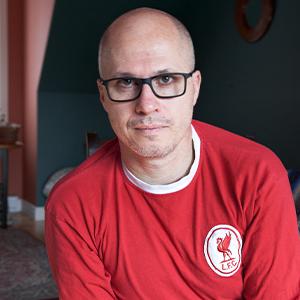
Aleksandar Hemon
Aleksandar (Sasha) Hemon
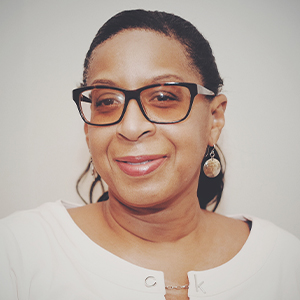
Donna Bailey Nurse
Donna Bailey Nurse


